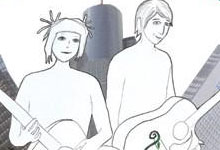
Tracks
The Wind Whistles: "After All"
(2009)
By Eric Sams | 14 August 2009
The upsurge in popularity of Boy/Girl twee around the middle of our current decade doomed it to the reactive shockwave of eye-rolling assholes decrying the format, which began to enjoy similarly phenomenal popularity around that same time. As the aughts enter their miniature fin de siecle, the popularity of reactive cynicism surely hasn’t waned—the assholes speak louder now, have multiplied, their website’s blog has Twitter—but twee, with the exception of stalwart founders like Belle & Sebastian, has by-in-large skipped gaily back into the gumdrop forest whence it came (somewhere in Northern England).
This is something of a shame. First, because it’s dubious democracy to measure the viability of any artistic output based on the reactions of blogerati, and second because I have always believed that twee was sneered into silence before it could display its inherent suitability as a go-to option for pop structure. Good twee was always a sub-genre concerned with the intermingling of distinctive styles. It kept records from calcifying into monoliths. It livened melodies with its jovial interplay. All of these laudable elements find voice in the verse-chorus-verse simplicity of the Wind Whistles’ “After All.”
Ok, yes, the song is cute. Almost as cute as the pencil sketch fuzzballs dicking around in the album art. All that mess about the unexplored possibilities of twee, and I pick a cut where the titular phrase is pared from a lover’s quaint reassurance, “After all I’ll still have you.” But admitting that a song is cute need not be an admission that the song is cutesy. Which is to say, a song can be cute while maintaining other qualities, and this one does. The soaring chorus is more than obligatory counterweight to the hitch-and-go acoustic guitar verses, and the lyrics there succeed in casting some long shadows over the verses’ sunny outlook: “What if our money stops flowing… / What if our talents go nowhere?”
There’s a pleasing, obvious balance here of the kind that twee always engendered when done correctly. And now that it’s merely music and not a movement we’ll be able to appreciate such benign contrasts without the din of clicking keyboards drowning them out.





